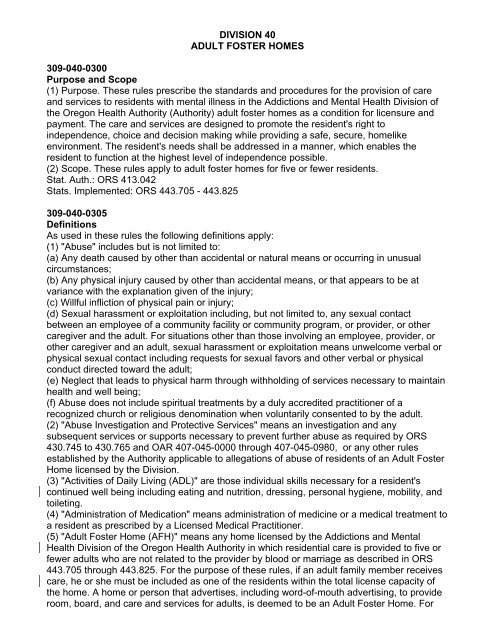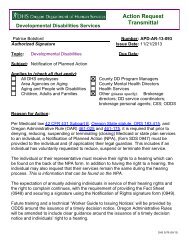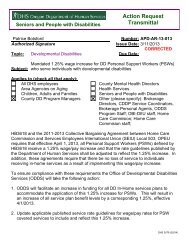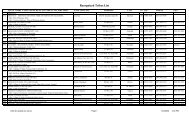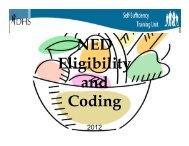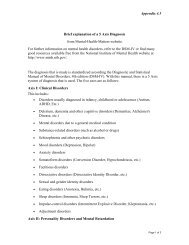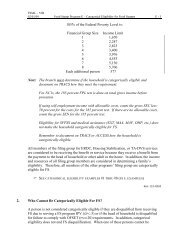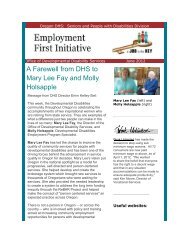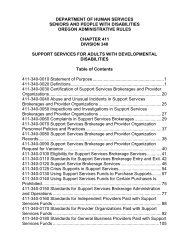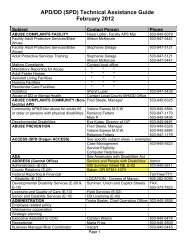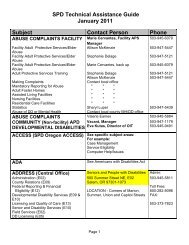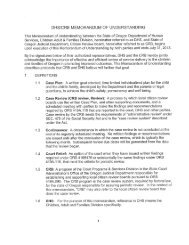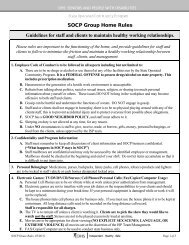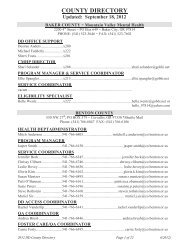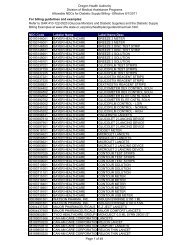DIVISION 40 ADULT FOSTER HOMES 309-040-0300 ... - DHS home
DIVISION 40 ADULT FOSTER HOMES 309-040-0300 ... - DHS home
DIVISION 40 ADULT FOSTER HOMES 309-040-0300 ... - DHS home
Create successful ePaper yourself
Turn your PDF publications into a flip-book with our unique Google optimized e-Paper software.
<strong>DIVISION</strong> <strong>40</strong><br />
<strong>ADULT</strong> <strong>FOSTER</strong> <strong>HOMES</strong><br />
<strong>309</strong>-0<strong>40</strong>-<strong>0300</strong><br />
Purpose and Scope<br />
(1) Purpose. These rules prescribe the standards and procedures for the provision of care<br />
and services to residents with mental illness in the Addictions and Mental Health Division of<br />
the Oregon Health Authority (Authority) adult foster <strong>home</strong>s as a condition for licensure and<br />
payment. The care and services are designed to promote the resident's right to<br />
independence, choice and decision making while providing a safe, secure, <strong>home</strong>like<br />
environment. The resident's needs shall be addressed in a manner, which enables the<br />
resident to function at the highest level of independence possible.<br />
(2) Scope. These rules apply to adult foster <strong>home</strong>s for five or fewer residents.<br />
Stat. Auth.: ORS 413.042<br />
Stats. Implemented: ORS 443.705 - 443.825<br />
<strong>309</strong>-0<strong>40</strong>-0305<br />
Definitions<br />
As used in these rules the following definitions apply:<br />
(1) "Abuse" includes but is not limited to:<br />
(a) Any death caused by other than accidental or natural means or occurring in unusual<br />
circumstances;<br />
(b) Any physical injury caused by other than accidental means, or that appears to be at<br />
variance with the explanation given of the injury;<br />
(c) Willful infliction of physical pain or injury;<br />
(d) Sexual harassment or exploitation including, but not limited to, any sexual contact<br />
between an employee of a community facility or community program, or provider, or other<br />
caregiver and the adult. For situations other than those involving an employee, provider, or<br />
other caregiver and an adult, sexual harassment or exploitation means unwelcome verbal or<br />
physical sexual contact including requests for sexual favors and other verbal or physical<br />
conduct directed toward the adult;<br />
(e) Neglect that leads to physical harm through withholding of services necessary to maintain<br />
health and well being;<br />
(f) Abuse does not include spiritual treatments by a duly accredited practitioner of a<br />
recognized church or religious denomination when voluntarily consented to by the adult.<br />
(2) "Abuse Investigation and Protective Services" means an investigation and any<br />
subsequent services or supports necessary to prevent further abuse as required by ORS<br />
430.745 to 430.765 and OAR <strong>40</strong>7-045-0000 through <strong>40</strong>7-045-0980, or any other rules<br />
established by the Authority applicable to allegations of abuse of residents of an Adult Foster<br />
Home licensed by the Division.<br />
(3) "Activities of Daily Living (ADL)" are those individual skills necessary for a resident's<br />
continued well being including eating and nutrition, dressing, personal hygiene, mobility, and<br />
toileting.<br />
(4) "Administration of Medication" means administration of medicine or a medical treatment to<br />
a resident as prescribed by a Licensed Medical Practitioner.<br />
(5) "Adult Foster Home (AFH)" means any <strong>home</strong> licensed by the Addictions and Mental<br />
Health Division of the Oregon Health Authority in which residential care is provided to five or<br />
fewer adults who are not related to the provider by blood or marriage as described in ORS<br />
443.705 through 443.825. For the purpose of these rules, if an adult family member receives<br />
care, he or she must be included as one of the residents within the total license capacity of<br />
the <strong>home</strong>. A <strong>home</strong> or person that advertises, including word-of-mouth advertising, to provide<br />
room, board, and care and services for adults, is deemed to be an Adult Foster Home. For
the purpose of these rules, an Adult Foster Home does not include facilities referenced in<br />
443.715(1)(2)(3)(4).<br />
(6) "Applicant" means any person or entity that makes an application for a license that is also<br />
the owner of the business.<br />
(7) "Assessment" means an evaluation of a resident and the resident's level of function<br />
completed by a case manager and provides the basis for the development of the resident's<br />
Personal Care Plan.<br />
(8) “Authority” means the Oregon Health Authority.<br />
(9) "Authorized Department Representative" means an employee of the Addictions and<br />
Mental Health Division or the designee of the local Community Mental Health Program.<br />
(10) "Behavioral Interventions" means those interventions that will modify the resident's<br />
behavior or the resident's environment.<br />
(11) "Bill of Rights" means civil, legal or human rights afforded to Adult Foster Home<br />
residents, which are in accord with those rights afforded to all other U.S. citizens, including<br />
but not limited to those rights delineated in the Adult Foster Home Bill of Rights as described<br />
in OAR <strong>309</strong>-0<strong>40</strong>-0390(7).<br />
(12) "Board of Nursing Rules" means the standards for Registered Nurse Teaching and<br />
Delegation and assignments to Unlicensed Persons according to the statutes and rule of the<br />
Oregon State Board of Nursing, chapter 851, division 47, ORS 678.010 to 678.445.<br />
(13) "Care" means the provision of but is not limited to services of room, board, services and<br />
assistance with activities of daily living, such as assistance with bathing, dressing, grooming,<br />
eating, money management, recreational activities, and medication management. Care also<br />
means services that promote maximum resident independence and enhance quality of life.<br />
(14) "Case Management" means identified services provided by qualified persons to<br />
residents by local, regional or state allied agencies or other service providers. Case<br />
management includes advocating for the resident's treatment needs, providing assistance in<br />
obtaining entitlements based on mental or emotional disability, accessing housing or<br />
residential programs, coordinating services including mental health treatment, educational or<br />
vocational activities, and arranging alternatives to inpatient hospital services.<br />
(15) "Case Manager" means a person employed by a local, regional, or state allied agency<br />
approved by the Division to provide case management services. In accordance with OAR<br />
<strong>309</strong>-032-0545(2)(g-j), Standards for Adult Mental Health Services, when a resident resides in<br />
a Adult Foster Home, the case manager shall assist in development of the Personal Care<br />
Plan. Additionally, the case manager must evaluate the appropriateness of services in<br />
relation to the consumer’s assessed need and review the Personal Care Plan every 180<br />
days.<br />
(16) "Community Mental Health Program (CMHP)" means the organization of all services for<br />
persons with mental or emotional disturbances, drug abuse problems, and alcoholism and<br />
alcohol abuse problems, operated by, or contractually affiliated with, a local mental health<br />
authority, operated in a specific geographic area of the state under an intergovernmental<br />
agreement or direct contract with the Division.<br />
(17) "Compensation" means payments made by or on behalf of a resident to a provider in<br />
exchange for room and board, care and services, including services described in the<br />
resident's Personal Care Plan.<br />
(18) "Complaint Investigation" means an investigation of any allegation that a provider has<br />
taken action, which is perceived as contrary to law, rule, or policy but does not meet the<br />
criteria for an abuse investigation.<br />
(19) "Condition" means a provision attached to a new or existing license, which limits or<br />
restricts the scope of the license or imposes additional requirements on the licensee.<br />
(20) "Contested Case Hearing" means an arbitrated hearing resulting in a directed or<br />
recommended action. The hearing is held at the request of the provider or the Division in<br />
response to an action, sanction, or notice of finding issued by the Division that would result in
the loss of license of the provider or other sanctions that would adversely affect the license of<br />
the provider. The hearing group is composed of:<br />
(a) The provider and if the provider chooses, the provider's attorney;<br />
(b) The Division as represented by the Attorney General's Office; and<br />
(c) The Office of Administration Hearings Administrative Law Judge.<br />
(21) "Contract" means a written agreement between a provider and the Division to provide<br />
room and board, care and services for compensation for residents of a licensed Adult Foster<br />
Home.<br />
(22) "Controlled Substance" means any drug classified as schedules one through five under<br />
the Federal Controlled Substance Act.<br />
(23) "Criminal History Check (CHC)" means the Oregon Criminal History Check and when<br />
required, a National Criminal History check and or a State-Specific Criminal History check,<br />
and the processes and procedures required by the rules OAR 943-007-0000 through 943-<br />
007-0500 Criminal History Check.<br />
(24) "Day Care" means care and services in an Adult Foster Home for a person who is not a<br />
resident of the Adult Foster Home. Children under the age of five living in the Adult Foster<br />
Home are included in the licensed capacity of the <strong>home</strong>.<br />
(25) "Declaration for Mental Health Treatment" means a document that states the resident’s<br />
preferences or instructions regarding mental health treatment as defined by ORS 127.700<br />
through 127.737.<br />
(26) "Director" means the Director of the Oregon Health Authority or that person's designee.<br />
(27) "Discharge Summary" means a document that describes the conclusion of the planned<br />
course of services described in the resident's individualized personal care plan, regardless of<br />
outcome or attainment of goals described in the resident's individualized personal care plan.<br />
In addition, the discharge summary addresses resident's monies, financial assets and<br />
monies, medication and personal belongings at time of discharge.<br />
(28) “Division” means the Addictions and Mental Health Division of the Oregon Health<br />
Authority.<br />
(29) “Employee” means a person who is employed by a licensed Adult Foster Home (AFH),<br />
who receives wages, a salary, or is otherwise paid by the AFH for providing the service. The<br />
term also includes employees of other providers delivering direct services to clients of AFHs.<br />
(30) "Exempt Area" means a county agency that provides similar programs for licensing and<br />
inspection of Adult Foster Homes which the Director finds equal to or superior to the<br />
requirements of ORS 443.705 to 443.825 and which has entered into an agreement with the<br />
Authority to license, inspect, and collect fees according to the provisions of 443.705 to<br />
443.825.<br />
(31) "Family Member" for the purposes of these rules, means a husband or wife, natural<br />
parent, child, sibling, adopted child, domestic partner, adopted parent, stepparent, stepchild,<br />
stepbrother, stepsister, father-in-law, mother-in-law, son-in-law, brother-in-law, sister-in-law,<br />
grandparent, grandchild, aunt, uncle, niece, nephew, or first cousin.<br />
(32) "Home" means the Adult Foster Home (AFH).<br />
(33) "Homelike Environment" means an Adult Foster Home setting, which promotes the<br />
dignity, safety, independence, security, health and comfort of residents through the provision<br />
of personalized care and services to encourage independence, choice, and decision making<br />
of the residents.<br />
(34) "House Rules" means those written standards governing house activities developed by<br />
the provider and approved by the Authority or designee. These standards must not conflict<br />
with the Adult Foster Home Bill of Rights.<br />
(35) "Incident Report" means a written description and account of any occurrence including<br />
but not limited to, any injury, accident, acts of physical aggression, use of physical restraints,<br />
medication error, any unusual incident involving a resident or the <strong>home</strong> and/or providers.
(36) "Informed Consent for Services" means that the services to be provided by the Adult<br />
Foster Home provider to the person have been explained to the person and guardian, if<br />
applicable, and explained in a manner that they may comprehend.<br />
(37) "Initial Personal Care Plan (IPCP)" means a written document developed for a resident<br />
within 24 hours of admission to the <strong>home</strong>. The document must address the care and services<br />
to be provided for the resident during the first 30 days or less until the Personal Care Plan<br />
can be developed. At a minimum the IPCP must contain goals that address the following:<br />
Immediate health care support needs, medication management issues, safety and<br />
supervision needs, activities of daily living that the resident needs assistance with completing<br />
as well as any pertinent information as required by the case manager or their designee at the<br />
time of the admission. The provider must develop an Initial Personal Care Plan (IPCP) within<br />
24 hours of admission to the Adult Foster Home.<br />
(38) "Level One Adult Foster Home" means an Adult Foster Home licensed by the Division to<br />
provide care and services to individuals with severe and persistent mental illness, who may<br />
also have limited medical conditions.<br />
(39) "License" means a document issued by the Authority to applicants who are determined<br />
by the Authority or designee to be in substantial compliance with these rules.<br />
(<strong>40</strong>) "Licensed Medical Practitioner (LMP)" means any person who meets the following<br />
minimum qualifications as documented by the CMHP or designee and holds at least one of<br />
the following educational degrees and a valid license:<br />
(a) Physician licensed to practice in the State of Oregon; or<br />
(b) Nurse practitioner licensed to practice in the State of Oregon.<br />
(41) "Licensee" means the person or entity to whom a license is issued and whose name(s) is<br />
on the license.<br />
(42) "Local Mental Health Authority (LMHA)" means the county court or board of county<br />
commissioners of one or more counties who choose to operate a community mental health<br />
program, or in the case of a Native American reservation, the tribal council, or if the county<br />
declines to operate or contract for all or part of a community mental health program, the<br />
board of directors of a public or private corporation which directly contracts with the Authority<br />
to operate a CMHP for that county.<br />
(43) "Mandatory Reporter" means any public or private official who, while acting in an official<br />
capacity, comes in contact with and has reasonable cause to believe that the adult has<br />
suffered abuse, or that any person with whom the official contact while acting in an official<br />
capacity, has abused the adult. Pursuant to ORS 430.765(2) psychiatrists, psychologists,<br />
clergy, and attorneys are not mandatory reporters with regard to information received through<br />
communications that are privileged under <strong>40</strong>.225 to <strong>40</strong>.295.<br />
(44) "Medication" means any drug, chemical, compound, suspension or preparation in<br />
suitable form for use as a curative or remedial substance taken either internally or externally<br />
by any person.<br />
(45) "Mental or Emotional Disturbances (MED)" means a disorder of emotional reactions,<br />
thought processes, or behavior that results in substantial subjective distress or impaired<br />
perceptions of reality or impaired ability to control or appreciate the consequences of the<br />
person's behavior and constitutes a substantial impairment of the person's social,<br />
educational, or economic functioning. Medical diagnosis and classification must be consistent<br />
with the Diagnostic and Statistical Manual of Mental Disorders of the American Psychiatric<br />
Association (DSM-IV). As used in these rules, this term is functionally equivalent to "serious<br />
and persistent mental illness."<br />
(46) “Mistreatment” means the following behaviors, displayed by an employee, program staff,<br />
provider or volunteer of an AFH when directed toward an individual:<br />
(a) “Abandonment” means desertion or willful forsaking when the desertion or forsaking<br />
results in harm or places the individual at a risk of serious harm.<br />
(b) “Financial Exploitation” means:
(A) Wrongfully taking the assets, funds, or property belonging to or intended for the use of an<br />
individual.<br />
(B) Alarming an individual by conveying a threat to wrongfully take or appropriate money or<br />
property of the individual if the individual would reasonably believe that the threat conveyed<br />
would be carried out.<br />
(C) Misappropriating, misusing, or transferring without authorization any money from any<br />
account held jointly or singly by an individual.<br />
(D) Failing to use the income or assets of an individual effectively for the support and<br />
maintenance of the individual. “Effectively” means use of income or assets for the benefit of<br />
the individual.<br />
(c) “Involuntary Restriction” means the involuntary restriction of an individual for the<br />
convenience of a caregiver or to discipline the individual. Involuntary restriction may include<br />
but is not limited to placing restrictions on an individual’s freedom of movement by restriction<br />
to his or her room or a specific area, or restriction from access to ordinarily accessible areas<br />
of the facility, residence or program, unless agreed to by the treatment plan. Restriction may<br />
be permitted on an emergency or short term basis when an individual’s presence would pose<br />
a risk to health or safety to the individual or others.<br />
(d) “Neglect” means active or passive failure to provide the care, supervision, or services<br />
necessary to maintain the physical and mental health of an individual that creates a<br />
significant risk of harm to an individual or results in significant mental injury to an individual.<br />
Services include but are not limited to the provision of food, clothing, medicine, housing,<br />
medical services, assistance with bathing or personal hygiene, or any other services<br />
essential to the well-being of the individual.<br />
(e) “Verbal Mistreatment” means threatening significant physical harm or emotional harm to<br />
an individual through the use of:<br />
(A) Derogatory or inappropriate names, insults, verbal assaults, profanity, or ridicule.<br />
(B) Harassment, coercion, punishment, deprivation, threats, implied threats, intimidation,<br />
humiliation, mental cruelty, or inappropriate sexual comments.<br />
(C) A threat to withhold services or supports, including an implied or direct threat of<br />
termination of services. “Services” include but are not limited to the provision of food,<br />
clothing, medicine, housing, medical services, assistance with bathing or personal hygiene,<br />
or any other services essential to the well-being of an individual.<br />
(D) For purposes of this definition, verbal conduct includes but is not limited to the use of oral,<br />
written, or gestured communication that is directed to an individual or within their hearing<br />
distance or sight, regardless of their ability to comprehend. In this circumstance the<br />
assessment of the conduct is based on a reasonable person standard.<br />
(E) The emotional harm that can result from verbal abuse may include but is not limited to<br />
anguish, distress, or fear.<br />
(f) “Wrongful Restraint” means:<br />
(A) A wrongful use of a physical or chemical restraint excluding an act of restraint prescribed<br />
by a licensed physician pursuant to OAR <strong>309</strong>-033-0730.<br />
(B) Wrongful restraint does not include physical emergency restraint to prevent immediate<br />
injury to an individual who is in danger of physically harming himself or herself or others,<br />
Provided that only the degree of force reasonably necessary for protection is used for the<br />
least amount of time necessary.<br />
(47) "National Criminal History Check" means obtaining and reviewing criminal history outside<br />
Oregon's borders. This information may be obtained from the Federal Bureau of Investigation<br />
through the use of fingerprint cards and from other criminal information resources in<br />
accordance with OAR 943-007-0000 through 943-007-0500 Criminal History Check Rules.<br />
(48) "Neglect" means an action or inaction that leads to physical harm through withholding of<br />
services necessary to maintain health and well-being. For purposes of this paragraph,
"neglect" does not included a failure of the state or a community program to provide services<br />
due to a lack of funding available to provide the services.<br />
(49) "Nurse Practitioner" means a registered nurse who has been certified by the board as<br />
qualified to practice in an expanded specialty role within the practice of nursing.<br />
(50) "Nursing Care" means the practice of nursing by a licensed nurse, including tasks and<br />
functions relating to the provision of nursing care that are delegated under specified<br />
conditions by a registered nurse to persons other than licensed nursing personnel, which is<br />
governed by ORS chapter 678 and rules adopted by the Oregon State Board of Nursing in<br />
OAR Chapter 851.<br />
(51) "Nursing Delegation" means that a registered nurse authorizes an unlicensed person to<br />
perform special tasks of client/nursing care in selected situations and indicates that<br />
authorization in writing. The delegation process includes nursing assessment of a client in a<br />
specific situation, evaluation of the ability of the unlicensed person, teaching the task and<br />
ensuring supervision.<br />
(52) "Personal Care Plan (PCP)" means a written plan outlining the care and services to be<br />
provided to a resident. The PCP is based upon the review of current assessment, referral,<br />
observations, resident preference, and input from members of the Personal Care Plan Team.<br />
The plan identifies the care, services, activities, and opportunities to be provided by the<br />
caregiver to promote the resident's recovery and independence.<br />
(53) "Personal Care Plan Team (PCP Team)" means a group composed of the resident, the<br />
case manager or other designated representative CMHP representative, the provider and or<br />
resident manager, and others needed including the resident's legal guardian, representatives<br />
of all current service providers, advocates or others determined appropriate by the resident<br />
receiving services. If the resident is unable or does not express a preference, other<br />
appropriate team membership must be determined by the PCP team members.<br />
(54) "Personal Care Services" means services prescribed by a physician or other designated<br />
person in accordance with the individual's plan of treatment. The services are provided by a<br />
caregiver that is qualified to provide the service and is not a member of the individual's<br />
immediate family. For those Adult Foster Home individuals who are Medicaid eligible,<br />
Personal Care services are funded under Medicaid.<br />
(55) "Practice of Registered Nursing" means the application of knowledge drawn from broad<br />
in-depth education in the social and physical sciences in assessing, planning, ordering,<br />
giving, delegating, teaching and supervising care which promotes the person's optimum<br />
health and independence.<br />
(56) “Program Staff” means an employee or person who, by contract with an AFH provides a<br />
service and who has the applicable competencies, qualifications, and certification, required<br />
by the Integrated Services and Supports Rule (ISSR) (OAR <strong>309</strong>-032-1500 through <strong>309</strong>-032-<br />
1565) to provide the service.<br />
(57) "Provider" means a qualified individual or an organizational entity operated by or<br />
contractually affiliated with a community mental health program, or contracted directly with<br />
the Division for the direct delivery of mental health services and supports to adults receiving<br />
residential and supportive services in an AFH.<br />
(58) "Psychiatric Security Review Board (PSRB)" means the Board consisting of five<br />
members appointed by the Governor and subject to confirmation by the Senate under<br />
Section Four, Article 111 of the Oregon Constitution and described in ORS 161.295 through<br />
161.<strong>40</strong>0 and OAR <strong>309</strong>-032-15<strong>40</strong>.<br />
(59) "Registered Nurse" means an individual licensed and registered to practice nursing by<br />
the State of Oregon Board of Nursing in accordance with ORS Chapter 678 and OAR<br />
Chapter 851.<br />
(60) "Related" means spouse, domestic partner, natural parent, child sibling, adopted child,<br />
adopted parent, stepparent, stepchild, stepbrother, stepsister, father-in-law, mother-in-law,
son-in-law, daughter-in-law, brother-in-law, sister-in-law, grandparent, grandchild, aunt,<br />
uncle, niece, nephew or first cousin.<br />
(61) "Relative" means any person identified as family members.<br />
(62) "Resident" means any person age 18 or older who receives room, board, care, and<br />
services in an Adult Foster Home.<br />
(63) "Resident Manager" means an employee of the provider who is approved by the Division<br />
to live in the Adult Foster Home and is responsible for the care and services of residents on a<br />
day-to-day basis.<br />
(64) "Residential Care" means the provision of room, board, and services that assist the<br />
resident in activities of daily living, such as assistance with bathing, dressing, grooming,<br />
eating, medication management, money management or recreation. Residential care<br />
includes 24 hour supervision; being aware of the residents' general whereabouts; monitoring<br />
the activities of the resident while on the premises of the Adult Foster Home to ensure their<br />
health, safety, and welfare; providing social and recreational activities; and assistance with<br />
money management as requested.<br />
(65) "Residents' Bill of Rights" means residents of the Adult Foster Home have the following<br />
rights as defined in ORS 443.739. Each resident has a right to:<br />
(a) Be treated as an adult, with respect and dignity;<br />
(b) Be informed of all resident rights and all house rules;<br />
(c) Be encouraged and assisted to exercise legal rights, including the right to vote;<br />
(d) Be informed of the resident's medical condition and the right to consent to or refuse<br />
treatment;<br />
(e) Receive appropriate care and services, and prompt medical care as needed;<br />
(f) A safe and secure environment;<br />
(g) Be free from mental and physical abuse;<br />
(h) Be free from chemical or physical restraints except as ordered by a physician or other<br />
qualified practitioner;<br />
(i) Complete privacy when receiving treatment or personal care;<br />
(j) Associate and communicate privately with any person the resident chooses;<br />
(k) Send and receive personal mail unopened;<br />
(l) Participate in activities of social, religious and community groups;<br />
(m) Have medical and personal information kept confidential;<br />
(n) Keep and use a reasonable amount of personal clothing and belongings, and to have a<br />
reasonable amount of private, secure storage space;<br />
(o) Manage the resident's own money and financial affairs unless legally restricted;<br />
(p) Be free from financial exploitation. The provider must not charge or ask for application<br />
fees or nonrefundable deposits and must not solicit, accept or receive money or property<br />
from a resident other than the amount agreed to for services;<br />
(q) A written agreement regarding the services to be provided and the rate schedule to be<br />
charged. The provider must give 30 days' written notice before any change in the rates or the<br />
ownership of the <strong>home</strong>;<br />
(r) Not to be transferred or moved out of the adult foster <strong>home</strong> without 30 days' advance<br />
written notice and an opportunity for a hearing. A provider may transfer or discharge a<br />
resident only for medical reasons including a medical emergency described in ORS<br />
443.738(11)(a), or for the welfare of the resident or other residents, or for nonpayment;<br />
(s) Be free of discrimination in regard to race, color, national origin, sexual orientation,<br />
disability, sex or religion;<br />
(t) Make suggestions and complaints without fear of retaliation.<br />
(66) "Respite Care" means the provision of room, board, care, and services in an Adult Foster<br />
Home for a period of up to 14 days. Respite care residents will be counted in the total<br />
licensed capacity of the <strong>home</strong>. Respite care is not crisis respite care.
(67) "Restraints" means any physical hold, device, or chemical substance, which restricts, or<br />
is meant to restrict, the movement or normal functioning of a resident.<br />
(68) "Room and Board" means the provision of meals, a place to sleep, laundry and<br />
housekeeping.<br />
(69) "Seclusion" means the involuntary confinement of an individual to a room or area where<br />
the person is physically prevented from leaving.<br />
(70) "Self-Administration of Medication" means the act of a resident placing a medication in or<br />
on their own body. The resident identifies the medication and the times and manners of<br />
administration, and placed the medication internally or externally on their own body without<br />
assistance.<br />
(71) "Self Preservation" in relation to fire and life safety means the ability of residents to<br />
respond to an alarm without additional cues and be able to reach a point of safety without<br />
assistance.<br />
(72) "Services" means those activities which are intended to help the residents develop<br />
appropriate skills to increase or maintain their level of functioning and independence.<br />
Services include coordination and consultation with other service providers or entities to<br />
assure residents access to necessary medical care, treatment, and/or services identified in<br />
the resident's personal care plan.<br />
(73) "Substitute Caregiver" means any person meeting the qualifications of a caregiver who<br />
provides care and services in an Adult Foster Home under the jurisdiction of the Authority in<br />
the absence of the provider or resident manager. A resident may not be a substitute<br />
caregiver.<br />
(74) "Unusual Incident" means those incidents involving acts of physical aggression, serious<br />
illnesses or accidents, any injury or illness of a resident requiring a non-routine visit to a<br />
health care practitioner, suicide attempts, death of a resident, a fire requiring the services of a<br />
fire Department, or any incident requiring an abuse investigation.<br />
(75) "Variance" means an exception from a regulation or provision of these rules, granted in<br />
writing by the Authority, upon written application from the provider.<br />
(76) “Volunteer” means a person who provides a service or who takes part in a service<br />
provided to individuals receiving supportive services in an AFH or other provider, and who is<br />
not a paid employee of the AFH or other provider. The services must be non-clinical unless<br />
the person has the required credentials to provide a clinical service.<br />
[Publications: Publications referenced are available from the agency.]<br />
Stat. Auth.: ORS 413.042<br />
Stats. Implemented: ORS 426.072, and ORS 443.705 - 443.825


